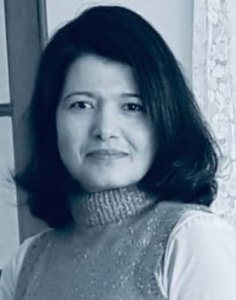Dr Reshma Perveen-Mosofir

Today I woke up to photographs on my newsfeed on social media showing women sitting in a ground with flour bags distributed on behalf of Saudi King Abdullah under Ramazan Package to the people of Hunza and Ghizer, prompting an uproar on social media raising many questions.
Although, for people outside Gilgit-Baltistan and across Muslim world, this would appear a normal practice as with the advent of the month of fasting some ‘philanthropists, traders and organisations distribute food items among deserving people and families.
However, this is unprecedented in Hunza, and the uproar against it is quite natural and rightfully so.
Some people see it as a failure of society, community leaders, while some think it was a cheap publicity stunt of the NGO. Some people seem in favour of the charity work but criticise the approach humiliating the receivers by making them sit in the ground with the packets for picture. Still, some deny the prevalence of poverty in Hunza altogether. Whatever the purpose was, but it is seen as undignified and humiliating in the name of charity.
The incident has brought to fore some questions. Should we stop here? Will the criticism stop others doing it? Or will they do it differently? What if we return the charity back as some suggested? Is it really a part of a bigger plan or invisible game to grab our land and resources?
While keeping all these questions alive and thinking around them, we also need to think of the lesson we have learnt. We have to dig deeper into the scourge of poverty that destroys human dignity, the factors behind rising economic disparities from historical and social perspective and seek remedy.
Historically, Hunza has been an egalitarian, self-contained and self-sustained society. People used to grow crops and rare cattle to meet their needs. Almost every household would own a piece of land, orchard, and a house.
It has remained cut off from the outside world for centuries; travelling to other towns or cities outside Hunza had almost been impossible partly because of inaccessibility and partly because of restrictions from the former ruler of the princely state till 1970s.
Hunza witnessed rapid transformation in ‘70s after the construction of the Karakoram Highway linking China to Pakistan and abolition of the princely state.
Mass education was made accessible to the people with opening of schools and health facilities in almost every village, and provision of essential food items like wheat, sugar, and other items on subsidised rates and public transport system were introduced.
Revolution in media and the globalization accelerated the pace of change and the onslaught of the media enticed young generation to migrate to Pakistani cities and abroad in search of quality education and better living. Today, a good number of people from Hunza are living in foreign countries including America, Canada, Australia and Europe.

After ‘80s the Hunza society witnessed a dramatic change. Although the global forces brought many opportunities for the remote mountain communities, these also posed many challenges as well. One such challenge was the fragmentation of the egalitarian society and emergence of a new social class. The elite class and educated class during the last four decades have been thriving on Sino-Pak border trade, NGOs, amassing wealth through rampant corruption, illicit business, rampant corruption, kickbacks in government departments and contracts.
There are many who have no access to basic facilities of life. As in any class-based society, the rich is getting richer while the rest are ignored or denied of fundamental rights.
This has disturbed and eroded the indigenous social and cultural values and knowledge. The uneven development and shrinking opportunities have pushed majority of the population towards abject poverty.
Although it is debatable and almost impossible to create a classless society, there is a possibility to ensure access of all to uniform, quality and free education and health systems, clean drinking water and jobs through political struggle that could create a balance and narrow the widening gap between the rich and the poor.
There are many professionals around the world who could contribute to balancing this disparity. However, to do that we need to have a reliable and sustainable developmental forum which should not only be limited to looking after individuals’ living but also address major social and economic issues like health, education and employment.
We all know that poverty does exist in Hunza in many forms. There are numerous people who could not afford quality education or better health care due to financial constraints. Provision of these facilities are the responsibilities of the state.
There is a dire need to create political awareness among the people about their rights. Force the government to ensure provision of these rights. At community level there is a need of a platform that could carry out a need assessment knowing the ground realities, prioritise areas, make planning and budgeting for education, health and infrastructure to start off with.
The lack of an honest and reliable platform makes many professionals hesitant to contribute.
Having said that, we could still manage to collaborate better across the many organizations if we could have a locally owned developmental platform.
 Dr Reshma Perveen Mosofir is a teacher by profession, she did her PhD from the University of Queensland and working as a research fellow in STEM education for schools at the same university. She Twitts@ReshPar
Dr Reshma Perveen Mosofir is a teacher by profession, she did her PhD from the University of Queensland and working as a research fellow in STEM education for schools at the same university. She Twitts@ReshPar

